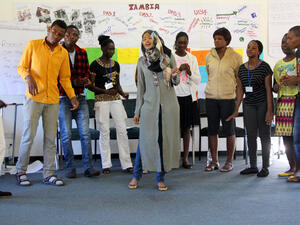After the terror ... the fallout
After the terror ... the fallout
Afghan refugees being relocated from Killi Faizo to Roghani.
Refugees and asylum seekers worldwide feel the effects of the September attacks in the United States
Afghanistan was, of course, the epicentre. In the maelstrom of fear and war that followed history's worst single act of terrorism in the United States, millions of civilians a half a world away became unintentional victims in the inevitable fallout, their misfortune being to live near the headquarters of 'World Terrorism, Inc.'
But while a veritable media armada recorded Afghanistan's suffering with around-the-clock coverage and rich nations offered to patch the country together again, tremors from the September attacks in New York and Washington were felt among refugees and asylum seekers in every corner of the globe.
Governments and politicians from America to Albania to Australia urgently debated anti-terrorism legislation which could affect refugees and asylum seekers. Some beefed up border controls and strengthened checks on all arrivals.
Newsweek magazine ran a cover story entitled "Will America lock its gates?" and editorialized: "Foreigners ... from students and technical workers to bedraggled refugees find themselves asking the question that never would have occurred to them before September 11 - is the United States closing its gates?"
Neighbouring Canada introduced tougher measures for front end security screening of asylum seekers immediately upon their arrival at land borders and airports.
Australia had leaped into the world headlines even before the attacks in the United States by refusing to allow more than 430 people, including many Afghans, who had been rescued from a sinking ship to land in the country and ask for asylum. They were eventually shunted to the improbable destination of Nauru, a tiny spec in the South Pacific, for processing.
The government introduced legislative amendments to restrict the scope for judicial interpretation of the provisions of the 1951 Convention, authorized interdiction at sea and withdrew remote areas on its own territory from a so-called 'immigration zone' thus denying foreigners arriving there the right to make asylum claims in liberal courts.
Which law
In a news interview High Commissioner Ruud Lubbers said he had sympathy with the dilemma faced by countries such as Australia. "At the same time, the answer cannot simply be 'Keep them out,'" he said. "You need to organize it in a way that we go for the law and not for the law of the jungle. That's a challenge, not only for Australia, but for governments together."
Washington temporarily a programme which annually welcomed for resettlement as many as 80,000 refugees unable to return to their own countries. An estimated 20,000 people who had already been vetted and were waiting to travel to the U.S. were blocked for several weeks until President Bush lifted the suspension.
Iran, whose borders were closed to prevent any major influx of Afghans, forcibly deported several hundred people who had nevertheless successfully made it to the country.
Even the Caribbean's sleepy Cayman Islands, famed for its tourist resorts rather than terrorism, did not escape the fallout. Three Afghan asylum were initially released and then put into protective custody following the attacks. In Mexico, around 100 Iraqi Chaldeans, most of whom were en route to America to seek asylum, were put into protective custody until their future could be sorted out.
Alarm and understanding
Humanitarian organizations were sympathetic to national security concerns, but worried about some developments.
"Refugees and asylum seekers are already the objects of considerable mistrust and hostility in many countries, and they are particularly vulnerable in the current climate," UNHCR High Commissioner Ruud Lubbers said. "We should beware of those politicians who claim to pursue the public cause, but simply exploit racial instincts."
UNHCR insists that the 1951 Refugee Convention, the cornerstone of international protection for uprooted peoples already contains provisions to exclude terrorists from being granted asylum.
"It is crucial that states understand that the Convention does not provide a safe haven to terrorists, nor does it protect them from criminal prosecution," the agency said. "On the contrary, it is carefully framed to exclude persons who commit particularly serious crimes."
In the aftermath of the September attacks, UNHCR publicly listed 10 specific areas of 'most concern.' They included the threat of increased racism and xenophobia and the possibility of governments using proposed, recently approved or longstanding legislation and resolutions improperly against uprooted peoples because of their religion, ethnicity, national origin or political views.
It was ironic, UNHCR noted, that refugees themselves were often escaping violence, including terrorism, and were not the perpetrators of such acts, despite that public perception in some countries.
Worldwide review
A worldwide review of proposed legislation underscored humanitarian concerns in many areas, but also some progress.
In the United States wives and children of persons found inadmissible on terrorism grounds could also be detained because of their family relationship and not for their own individual actions. Another clause would raise the bars to asylum, possibly excluding persons deserving refugee status.
In Canada an Immigration and Refugee Protection Act which had been wending its way through Parliament since February and which was viewed as overly restrictive by some advocates, rapidly received royal assent.
In October, a 171-page anti-terrorism bill was introduced. Critics worried about the wide new powers the proposed law would give the police and courts. Immigration Minister Elinor Caplan announced a five point security strategy, including the fast-track preparation of tamper-proof permanent resident cards for new immigrants; tighter security screening of asylum claimants; increased detention and deportation capacities and the hiring of new staff at ports of entry.
The buzz word in immigration circles at the end of the year was 'harmonization' of immigration and refugee policies between Canada and the United States, though there were fears that any such cooperation would tilt towards tougher U.S. policies rather than the more liberal Canadian approach.
Prime Minister Jean Chrétien, however, insisted, "This government is going to resist the temptation of hastily reforming the system to the detriment of the country's liberal traditions and its welcome to immigrants and refugees."
European moves
Across the Atlantic, the European Commission tabled its own legislative proposals to combat terrorism and streamline extradition procedures between member states. The refugee agency expressed some reservations on both.
The listing of such crimes as extortion, theft or robbery would not always be severe enough to warrant a person being 'excluded' from the provisions of the 1951 Convention, UNHCR said. The "vague and broadbrush approach in defining terrorist offensives ... may risk unjustifiably widening the applicability of the Convention's exclusion clauses through the interpretive 'back door.'"
The second proposal, while aiming to enforce the transfer of persons suspected of crimes between two states, should include safeguards to ensure that the protection of a refugee is not undermined by his extradition. Among other things, return arrangements to the country where a refugee is recognized should be put into place after prosecution or, at the very least, after serving a sentence.
Individual European countries considered their own measures. British Home Secretary David Blunkett introduced a sweeping anti-terrorism bill which would suspend and could deny the right to seek asylum of persons detained under the proposed legislation.
"Existing refugee law protects asylum seekers while also ensuring the interests of states whose duty is to protect the public," Anne Dawson-Shepherd, UNHCR's Representative in the United Kingdom, said. "Any move to deny or suspend access to the full asylum procedures is therefore unnecessary and would be an erosion of the commitment" to the 1951 Refugee Convention.
White Paper
The government was also working on a 'White Paper' to set up reception centres for some asylum seekers, all of whom would be issued with new 'smart' identity cards.
Blunkett insisted the government would continue to support people in need of refuge. "I am determined that the government will maintain firm border controls: but I am equally determined that that must not obstruct our obligations to provide protection to those who need it."
In Germany, government coalition parties agreed in principle on its own anti-terrorism package. Features would include provisions to facilitate the removal of suspected political extremists and allow authorities easier access to information on asylum seekers who could then become 'a target group of suspicion.
The Austrian government announced persons would no longer be able to file asylum applications in its embassies following a huge increase in claimants in Pakistan and Iran.
The xenophobia feared by humanitarian leaders surfaced during elections in Denmark, normally one of the world's most enlightened countries toward refugees. Mogens Camre, a European Parliament member, insisted that "All western countries have been infiltrated by Muslims, some of whom are polite to us while waiting until there's enough of them to get rid of us."
In Bosnia and Herzegovina, a new package of proposed legislative measures would include extradition language without any safeguards against the forcible return home of vulnerable civilians (refoulement), provisions for detention which do not take into account international refugee law principles and an amendment to deprive some naturalized citizens of their passports.
Albania said it would amend its Law on Foreigners and then expelled five persons of Arabic origin, raising concerns about the possible future treatment of asylum seekers of similar ethnic background.
Croatia and Bulgaria both tightened their border controls.
Some hope
According to some humanitarian legal analysts the whole edifice of international protection, including the 1951 Convention itself, had been under pressure for years and the September attacks had added another powerful jolt.
Particularly worrisome were concerns that legislation which might unfairly target refugees, once enacted, might take years, if ever, to undo. Also the widening perception, often fuelled by politicians and the media, of refugees and asylum seekers as automatic terrorist suspects. In some countries the words 'bogus' and 'refugees' have already become virtually synonymous.
But not everything was bleak.
In the United States, UNHCR welcomed the inclusion of habeas corpus actions (challenging the constitutionality of a detention decision) which could be brought in any federal court which was included in the new anti-terrorism package. There were also proposed automatic six-month reviews for people detained but still awaiting deportation and the easing of detention restrictions in some individual cases.
While debating stronger security measures, the German government said it would introduce a new immigration law which would stipulate that persons subject to persecution by so-called 'non-state agents' such as rebels or militia would be considered as refugees within the framework of the Convention. The proposed change would bring Germany into line with virtually all other signatory countries and end an anomaly where civilians fleeing countries such as Taliban-held Afghanistan were routinely excluded from asylum consideration.
Turkey also said it would reinforce the protection of Afghan asylum seekers by suspending the deportation of rejected claimants and delaying the finalization of negative decisions.
Most ironic of all, the current carnage in Central Asia could eventually offer longer term hope to millions of people who have become new victims in a new kind of war and those who had effectively been abandoned for years to seemingly permanent exile in refugee camps.
But things will never be quite the same again, anywhere, and it is probably too soon to know the long term effects of September 11 for millions of people seeking a safer life.
The Newsweek cover story on immigration intoned of America's new attitude: "Some deserving people may be kept out, but so might a few dangerous terrorists. It's the price visitors and Americans must pay for a safer country." That is a worry worldwide for refugees.





